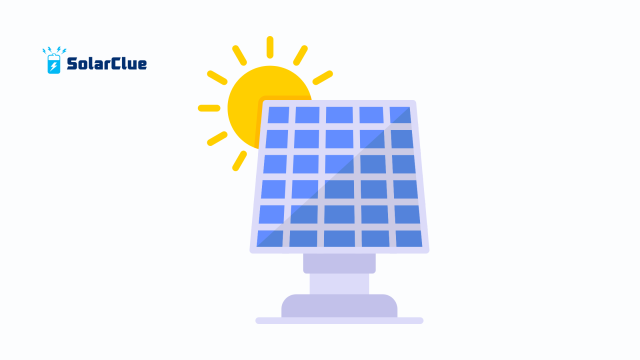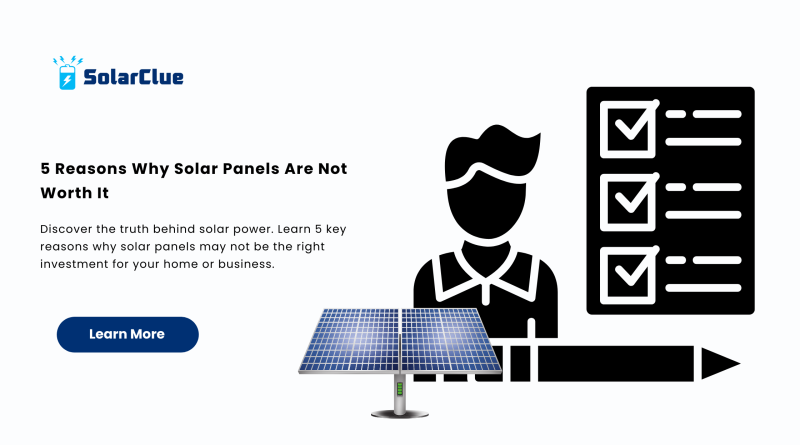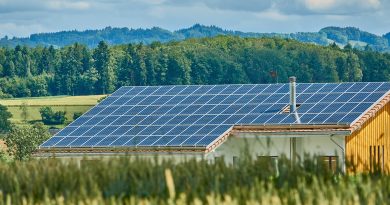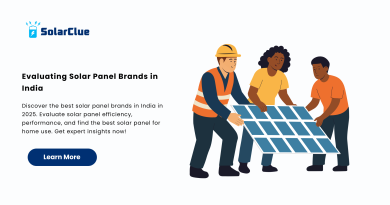5 Reasons Why Solar Panels Are Not Worth It
The buzz around solar energy continues to grow, promising lower electricity bills and a greener future. But is it all sunshine and savings? For many, solar panels seem like the perfect solution—but they’re not always the best fit. In this article, we dive into 5 reasons why solar panels are not worth it, especially for certain households and locations. Whether you’re considering a solar power system for your home or simply exploring options, this article will provide clarity before you make a costly decision.
Table of Contents
- 1 1. High Upfront Costs That Take Years to Recover
- 2 2. Inconsistent Energy Production
- 3 3. Limited Roof Space and Poor Orientation
- 4 4. Decreasing Incentives and Subsidies
- 5 5. Environmental Impact of Manufacturing and Disposal
- 6 When Are Solar Panels Worth It?
- 7 Consider These Alternatives
- 8 Think Long-Term and Local
- 9 Final Thoughts
- 10 FAQs
1. High Upfront Costs That Take Years to Recover
Although solar panels are marketed as a way to save money, the initial investment can be overwhelming. Purchasing and installing the best solar panel for home use can range from ₹1.5 lakhs to ₹4 lakhs or more, depending on the system size and quality. Even with government subsidies, many homeowners find that the payback period—the time it takes to recover the costs through energy savings—can stretch beyond 7 to 10 years.
Also, don’t forget to factor in the cost of maintenance, inverter replacements, and insurance. These additional costs often catch people by surprise, significantly affecting the return on investment.
2. Inconsistent Energy Production
One of the biggest solar panel disadvantages is their dependence on sunlight. If you live in an area with frequent rains, cloudy skies, or shading from trees and buildings, your solar panel efficiency drops dramatically. Unlike grid electricity, which is consistent, solar power production is unpredictable.
Even the best solar panel won’t perform optimally in poor weather conditions. For many, this inconsistency results in a continued reliance on grid power, defeating the purpose of going solar in the first place.
3. Limited Roof Space and Poor Orientation
Installing solar panels requires sufficient, unobstructed roof space with proper orientation to the sun. Many homes simply don’t meet these requirements. Roofs that are too small, shaded, or not facing the right direction will not allow for optimal energy production.
This is especially problematic in densely populated areas where real estate is limited. Even if you want to use solar panels for home, structural limitations can make installation inefficient or even impossible.
4. Decreasing Incentives and Subsidies
In the past, generous government incentives made investing in solar energy more appealing. However, these incentives are gradually being reduced or eliminated altogether. Without these financial aids, the cost-effectiveness of solar panel systems takes a big hit.
As a result, the solar power system you install today might not offer the same economic benefits that earlier adopters enjoyed. This changing landscape can significantly impact your long-term savings.
5. Environmental Impact of Manufacturing and Disposal
Ironically, the production of solar panels involves energy-intensive processes that contribute to pollution and greenhouse gas emissions. The mining of raw materials like silicon and rare earth metals comes with a significant environmental toll.
Moreover, disposing of old or broken panels is still a major challenge. Most solar panels contain hazardous materials that are not easy to recycle, contradicting their ‘green’ image.
When Are Solar Panels Worth It?

To be fair, solar panels can be a great investment—under the right conditions. If your home has ample sun exposure, high electricity bills, and access to active subsidies, the equation changes dramatically. But for others, the math simply doesn’t work out.
Consider These Alternatives
If you’re concerned about costs or environmental implications, consider these alternatives:
- Energy-efficient appliances
- LED lighting
- Smart thermostats
- Partial solar systems with grid tie-in
These smaller changes can yield significant savings without the high upfront costs.
Think Long-Term and Local
One crucial factor is your local energy rate. In areas with cheap electricity, switching to solar power may not provide meaningful savings. Additionally, check if net metering policies are favorable in your state; otherwise, you might not be compensated fairly for excess power sent to the grid.
Final Thoughts
Before jumping into a long-term commitment, evaluate your situation carefully. The promise of solar energy is tempting, but the reality is more nuanced. From high upfront costs to inconsistent performance, there are valid reasons why solar panels are not worth it for many households.
If you’re looking for more in-depth analysis, explore our latest insights on solarclue.com. And for expert guidance, check out our comprehensive blog at blog.solarclue.com.
FAQs
1. Are solar panels really not worth it?
They can be worth it for some homes, but for many, the costs and limitations outweigh the benefits.
2. How long does it take to recover the cost of solar panels?
It typically takes 7–10 years to break even, depending on your usage, location, and local subsidies.
3. What are the main disadvantages of solar panels?
High upfront costs, inconsistent energy production, environmental concerns, and space limitations.
4. Do solar panels work on cloudy days?
Yes, but their efficiency drops significantly, meaning you may still rely on grid power.
5. Is there a better alternative to solar panels?
Energy-efficient appliances and smaller renewable solutions may be more cost-effective for some households.
Still unsure? Don’t miss the smarter way to stay informed—visit solarclue.com and read more insightful content on blog.solarclue.com. Let your curiosity shine brighter than the sun!



